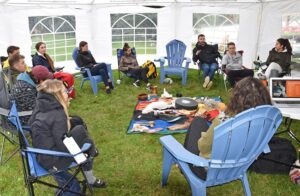NOSM students trained on Nipissing First Nation to be more culturally mindful

By Kelly Anne Smith
NIPISSING FIRST NATION— A first-year medical student and a very busy cultural mindfulness trainer from Nipissing First Nation are working to ease healthcare disparities experienced by Indigenous people.
When the COVID-19 global pandemic forced the Northern Ontario School of Medicine (NOSM) to offer Indigenous community placements online, NOSM student Eric Bourdon knew there was a better option.
Under normal circumstances, the students would have spent six weeks in an Indigenous community, says Bourdon.
“Every student would have been placed in a different community, but under COVID-19 circumstances, we weren’t able to spend those six weeks in person and the virtual placements just didn’t provide the experience that was intended, I think, for the placements. On top of that, we were to spend 20 hours in-person to get those experiences.”
Bourdon knew cultural mindfulness trainer George Couchie well – he worked with his father and grandfather in policing.
“We have a lifetime to learn. These few days have definitely helped us be on the right path to learning. But I think, especially in a complex field like medicine, we’ll be learning throughout our entire lifetimes but George has really set us up to have a good start with that,” says Bourdon. “There have been some experiences with Indigenous people in medicine and this experience will definitely help us out. I can’t imagine some of the issues so far that we have been learning, myself and my group of colleagues that are in year one. Experiences like this [are] helping us get a better mindset.”
Bourdon says it is going to take a lot of courage and strength to change the system.
“If we incorporate a lot of the teachings and the Seven Grandfather Teachings that we learned about, I think we can begin to make a positive change within the medical community.”
Bourdon and the other future doctors have been enthusiastic about being part of the ceremonies.
“Everybody is excited to hold the medicine in their hands and to participate. Virtual placements were good but when you hold the tobacco and you participate in the smudges, it really does make a difference than just hearing about it or speaking about it.”
Retired Ontario Provincial Police officer and Cultural Mindfulness trainer George Couchie was eager to be part of the training for future doctors.
Couchie decided to bring them into the community and do the training on the shore of Lake Nipissing.
“They were talking about NOSM going out into the community. On the first day in the morning, we talked about culture. In the afternoon we talked about history. Yesterday morning we talked about the effects of Residential Schools, the Indian Act, Indian hospitals, and how the media plays a big part in that. We also talked about the incidents in Quebec. There was another news clip I showed them about the running water in Canada like 150 communities not having running water.”
Guest lecturer Dr. Brenda Restoule was on site talking about her role within Nipissing First Nation and her role across Canada, and how people are dealing with Indigenous people.
Couchie invited his son to speak as well.
“My son Robbie spoke at the end of the day. He talked about his journey, how he struggled with drugs. Now he is in a better place. He has been accepted into the military. The students really needed to hear those stories from Brenda and Robbie.”
The students listened intently to Nourish Health Care’s Mair Greenfield as she talked about the importance of traditional foods in hospitals for faster healing.
Couchie explains traditional foods need to be in our hospital settings because food is medicine.
“This [lecture] provides health care leaders with knowledge and tools to decolonize food in health care. It’s fighting for the land and traditional foods,” he says. “When you bring people from the north, you have to look at the history, too. And are we triggering them when we give them something like porridge that they had at Residential Schools? Maybe bringing in fresh fish to help them heal quicker.”
Dr. Paul Preston, the head of Local Health Integration Network, spoke with the students as well, says Couchie.
“He’s really trying to change the way Indigenous people are looked after in the northeast region,” Couchie explains. “He has really taken his role seriously about changing racism within the hospitals. When I told him I was bringing these students out here, he was excited to come. Cultural awareness needs to start from the bottom up.”
Couchie and the doctors discussed that everyone has a story.
“And that we need to slow down when we are talking to someone to find their whole story,” Couchie said. “There is a reason people come into the hospital. There is a reason behind that and you need to find what that reason is.
Couchie calls it a big journey to change healthcare.
“This is a good step. We are going in the right direction.”
“We’re trying to sing,” says Bourdon about the students singing to close out the day. “I think everybody was excited to come out here to this beautiful place and take part in that. It’s very powerful.”
“A huge shout-out to George and everybody that came to speak to us. There’s been a lot shared that’s not easy to share. We can thank George a thousand times but the thank yous that he won’t get will be from our patients when it helps them in the future. They are making a huge difference.”


